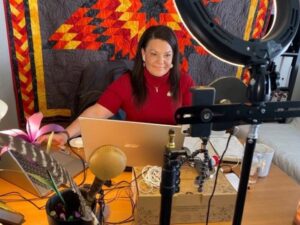Pandemic podcasts earning Indigenous and non-Indigenous praise nationally

By Sam Laskaris
OTTAWA – Though her efforts are receiving plenty of praise, Marion Crowe would actually prefer that she was not still doing some of her current work.
Crowe is the CEO of the First Nations Health Managers Association (FNHMA). Since last March, she has been hosting town hall podcasts from her Ottawa home to update listeners with news and information regarding the coronavirus disease 2019 (COVID-19) pandemic.
The podcasts, which feature interviews with professional health practitioners as well as Indigenous leaders, are primarily geared at protecting Indigenous people across the country.
But Crowe has discovered that many regular listeners of the podcasts are non-Indigenous.
“They find we are speaking in layman’s terms which are very easy to understand,” Crowe said. “We’re super happy non-Indigenous Canada is tuning in.”
The FNHMA is a national association that services the needs of those working for or aspiring to work with First Nations organizations that are in charge of providing training, certification and professional development opportunities in the health management industry.
Crowe said the original goal of the podcasts was to provide pandemic information from last March until June of 2020. But when a second wave arrived, she said the decision was made to have a second season of the podcasts, which are titled “Indigenous Health Today”, starting in September and continuing into December.
With the pandemic still pressing on, Crowe said FNHMA officials opted to continue staging their podcasts. Season 3 began this month and will continue until Apr. 1 and are available at www.ihtoday.ca/townhall.
“We didn’t think we’d still be doing this now,” Crowe said.
Some 150 radio stations across the country are now broadcasting the podcasts, which are available every Thursday.
In addition to that, many others, including Anishinabek Nation, are offering live streaming of the podcasts on their respective Facebook pages.
“We’re super happy that we have that live broadcast,” said Crowe, who was the founding executive director of the FNHMA back in March of 2010.
Crowe added that she is excited to see the number of people who are tuning in for her podcasts. She said tracking information indicates that a minimum of about 1,500 individuals tune in for the broadcasts and that at times, the number of listeners increases to as many as 15,000 people.
And with those who download the podcast and listen later on, Crowe said the weekly reach could be as many as 20,000 listeners.
Crowe is encouraging listeners to send in questions, which could potentially be addressed on the podcast. Questions can be sent to fnhma@ihtoday.ca
There has certainly been no shortage of topics to discuss during the podcasts. The importance of data collection related to the pandemic as well as the infrastructure of e-health are frequent issues talked about.
“Now we’re hoping we can add where we are with the vaccines,” said Crowe, a member of Piapot First Nation in Saskatchewan.
She added she also delves into other topics during her broadcasts.
“We even talk about the darker things that people aren’t talking about,” Crowe said.
These darker topics include domestic abuse, which continues to occur during the pandemic as well as the unsafe supply of drugs that people are using.
Crowe said there has been an increase in unsafe drug use throughout Indigenous communities across the country. And that’s not just because the Canada/US border remains closed to non-essential travel.
Crowe said many Indigenous communities throughout the country have been in lockdown or continue to be during the pandemic, which means many individuals who are using drugs will still try to get them, even if it means acquiring supplies deemed unsafe.

